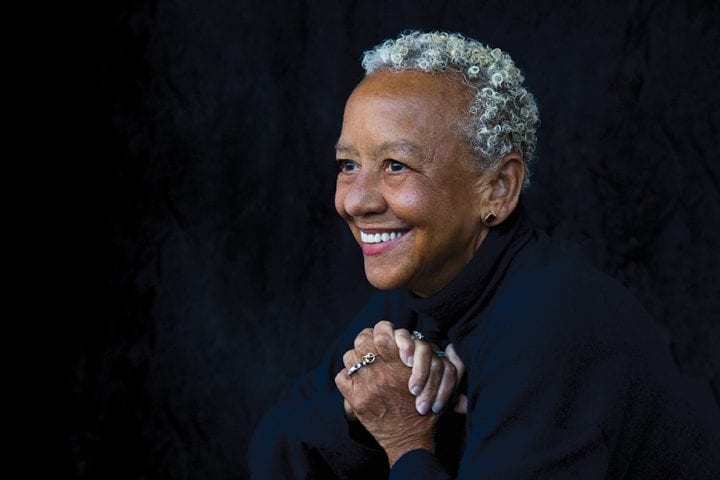
Writing Alongside “Knoxville, Tennessee”
January 16, 2018
Today, the words and wisdom of legendary poet, Nikki Giovanni, will wow us at the first event in our 2017/18 Sherman Alexie Loves Series. Although the event is sold out, there will be a limited number of tickets available at the door.
In this essay, WITS Writer-in-Residence Laura Gamache welcomes us into Nikki’s beautiful descriptions of family, friends, and food, by taking a look at her poem “Knoxville, Tennessee.” Plus, she gives us a Nikki-inspired writing prompt so that we can celebrate our own experiences in a similar vein.
By Laura Gamache, WITS Writer-in-Residence
Three-time NAACP Image Award Winner Nikki Giovanni has been a defining voice in American literature and activism since the 1960s. She attended Nashville’s Fisk University, a historically Black university, where she helped restore Fisk’s chapter of the Student Nonviolent Coordinating Committee (SNCC), an organization at the forefront of the Civil Rights Movement. After graduating with honors in 1967, she moved to Cincinnati, where she established the city’s first Black Arts Festival. She published her first book of poetry, Black Feeling, Black Talk, in 1968, and has since published 26 more, including her latest, A Good Cry: What We Learn from Tears and Laughter, which came out in October. Giovanni went to graduate school at University of Pennsylvania, and at Columbia University in New York. She is University Distinguished Professor at Virginia Tech, where she has taught since 1989.
Her poem “Nikki Rosa” details stark realities of African-American poverty and exclusion, alongside delightful family details like “how good the water felt when you got your bath,” and “you / and your sister have happy birthdays and very good / Christmases.” The poem continues, “I really hope no white person ever has cause / to write about me,” since that white person won’t understand “Black love is Black wealth,” that “they’ll / probably talk about my hard childhood / and never understand that / all the while I was quite happy.” I’m a white person, and I know this part of the poem is a little bit tongue-in-cheek, but one beauty of “Nikki-Rosa” as of Giovanni’s body of work, is that she shows me that Black wealth so openly and clearly that I get it.
Born Yolande Cornelia Giovanni, Jr., on June 7, 1943, in Knoxville, Tennessee, Nikki Giovanni’s family moved to the Cincinnati area when she was a girl, continuing to spend time in Knoxville with friends and family, including her grandmother. “Knoxville, Tennessee” evokes this particular community through food, place, and music, and it invites the reader to experience and celebrate these things. It shares African-American experiences, and as it shares, shows our common humanity. Since she so generously and particularly welcomes me and you into the world of the poem, let’s go to “Knoxville, Tennessee”:
—
Knoxville, Tennessee
by Nikki Giovanni
I always like summer
best
you can eat fresh corn
from daddy’s garden
and okra
and greens
and cabbage
and lots of
barbecue
and buttermilk
and homemade ice-cream
at the church picnic
and listen to
gospel music
outside
at the church
homecoming
and go to the mountains with
your grandmother
and go barefooted
and be warm
all the time
not only when you go to bed
and sleep
—
The poem’s images, sensory delights, pile on right from the start, with the taste of fresh corn. My grandparents grew corn in their garden in McMinnville, Oregon, and I spent many summer evenings shucking it and shelling peas with my great grandfather on the back steps. Or, I might center on winter time, my grandmother playing carols on piano and all of us singing along as the turkey grew fragrant and the mince pies cooled.
What season do you like best? What can you eat then? When and where is your community together? What celebrations draw you into community? Where have you gone with family that defines who you are?
I love how the first stanza of the poem opens to a time of year, but centers on food. What do you cook that you love? When does the eating of this food happen? Try writing your experiences, as Giovanni does, in second person – putting the reader in your shoes.
The second stanza begins with a place, the church picnic. Where might you place your second stanza? At a campsite? Family reunion? Somewhere specific in the U.S. or in another country? Everyone has visceral food associations. Whether injera at Eid to break the Ramadan fast, red beans and rice at Mardi Gras, cut oranges out of a bag on the soccer field sidelines, whatever and whenever you prepare and eat, you have something, as I do, to write about it.
—
Oysterville, Washington
by Laura Gamache
I always like months
with “r” in them
best
you can eat raw oysters
scooped off the shell
or carried to
the campsite
and barbecued over
flame
wrapped in bacon
or plain
and for November
my birthday
cake
when everyone sings
around our big table
and I get to see
their faces
lit warm by candle light
before I wish
and blow
which as I’ve gotten
older
is the
best
present of all
—
Play with it. You don’t have to have two stanzas, or even capitalize words or use punctuation, which gives permission to leave things open and try another tack. You don’t have to be certain or erudite, you only have to write from your own senses, with clear eyes and from your heart.
 Laura Gamache believes reading and writing can save your life. She holds an MFA from the University of Washington, directed their Writers in the Schools MFA Internship Program for 10 years, and has been a WITS writer since 1997. She was a Jack Straw Writers Program fellow in 1999 and 2002, Finishing Line Press published her chapbook, “nothing to hold onto,” and her poems and teaching essays have appeared in many print and on-line journals and anthologies, most recently Sixfold Poetry (Summer 2016). Her band, Feeble Prom Date, is imaginary.
Laura Gamache believes reading and writing can save your life. She holds an MFA from the University of Washington, directed their Writers in the Schools MFA Internship Program for 10 years, and has been a WITS writer since 1997. She was a Jack Straw Writers Program fellow in 1999 and 2002, Finishing Line Press published her chapbook, “nothing to hold onto,” and her poems and teaching essays have appeared in many print and on-line journals and anthologies, most recently Sixfold Poetry (Summer 2016). Her band, Feeble Prom Date, is imaginary.